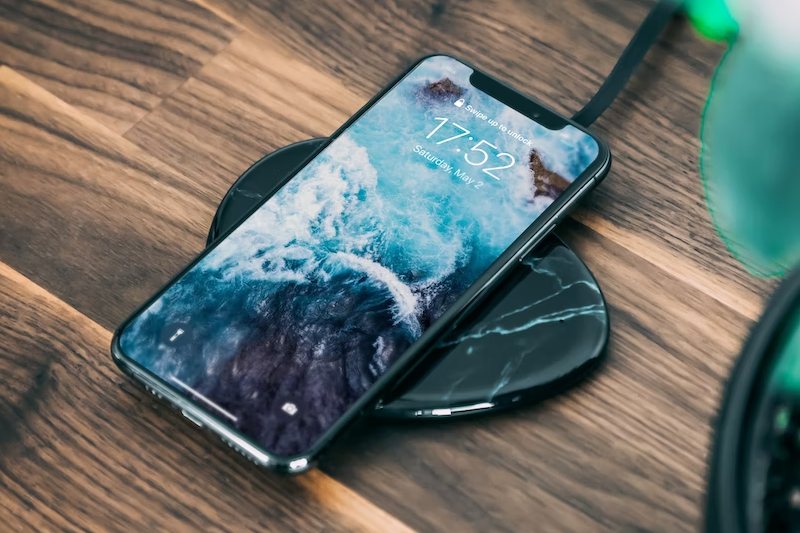Why is Wireless Charging So Popular?
A wireless mobile charger eliminates the need for lightning cables, micro-USB cables, and USB power converters by allowing you to recharge your phone by simply placing it on the wireless charger.
Wireless charging is currently supported only by newer model phones, but this is expected to change in the future. Phone manufacturers are increasingly relying on wireless charging.
When combined with bluetooth technology for earbuds and speakers, this move would eventually eliminate all phone ports. That day hasn't arrived yet, but in the meantime, more and more phones with wireless charging capabilities are hitting the market.

Wireless mobile chargers make your life easier, which is always a good thing in today's hectic world. Wireless chargers have the following advantages:
All-in-one charging: A wireless mobile charger can power all Qi-compatible devices, such as phones, tablets, headsets, and wireless earbuds.
Less clutter: There's no need to keep track of multiple cords and cables, which frequently get misplaced or broken. Because a single mobile wireless charger can replace them all, wireless charging is a popular choice for travelling.
Extending battery life: Charge your phone whenever you have a few minutes to give it a quick boost in battery life.
Safe connections: Because all charging occurs within the phone, there is no risk of corroded USB ports, lowering the risk of charging errors or electrical faults. You also never have to worry about electrical problems caused by unreliable third-party charging cables.
No Wear and Tear: Regularly plugging phones into power cables increases the risk of damaging phone ports, which can result in expensive repairs.
No Risk of Overheating: When a Qi-compatible phone is fully charged, the wireless charger turns off, saving energy and preventing the battery from overheating.
Wireless Charging Vs Wired Charging: Which is Better?
Charge Time
Wireless chargers typically take longer to charge a device than wired chargers, but this does not imply that one is superior to the other- it simply depends on your needs! Wired charging might be the best choice if your phone dies in the middle of the day and you have to rush to an important meeting because it charges more quickly and allows you to resume normal activities more quickly.
If you're not in a hurry, wireless charging is a better option because it's more convenient and takes less time to charge your device.
Ease of Use
Wireless charging is more convenient than wired charging because there are no cables to connect. Place your phone on the charger to start charging.
However, if you have many devices to charge, wired charging may be a better option because you can charge multiple devices simultaneously with a multi-port charger. A dual USB charger, for example, can charge your laptop and phone at the same time.
Furthermore, due to its convenience, wireless charging may be the best option if you own a car. Place your phone on the dashboard or the cup holder to start charging it.
Safety
One advantage of wired charging is that it is more dependable because there is no interference from other devices that could cause your battery to stop charging.
On the other hand, as technology progresses, wireless chargers are becoming more dependable. Furthermore, some wireless chargers include safety features that keep your device from overheating or overcharging.
Durability
Cables are easily damaged, especially if they are moved or bent frequently. This can result in charging issues or even device damage. On the other hand, wireless chargers are far more robust and unlikely to break.
Wireless chargers also do not have any exposed metal parts that can be damaged or cause an electrical short if moved around a lot. Cords tangle easily; wireless charging eliminates this problem because there are no cords to get tangled in.
Price
In general, wireless chargers cost more than wired chargers. On average, wireless chargers can cost up to twice as much as wired chargers, which is a huge price difference.
Even if wireless charging is more expensive, it is usually worthwhile due to its convenience for your mobile device. The convenience of a wireless charger often compensates for its higher price!
Compatibility
Qi-certified wireless chargers are compatible with most new devices, whereas wired chargers only work with specific devices. For example, wired chargers with Lightning ports are only compatible with Apple devices.
There are cases available for several different models of iPhones, and they're designed so that you don't have to remove your phone from the case to charge it wirelessly.
Conclusion
Wireless charging is a good option if you are not in a hurry because it is more convenient and takes less time to charge your device. Wireless chargers are becoming more reliable as technology improves.
Wired charging is still more reliable if you need to charge your device quickly. In addition, wired chargers are less expensive than wireless chargers.
Finally, your requirements and preferences determine the best option for you.
